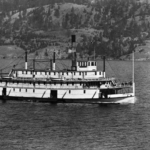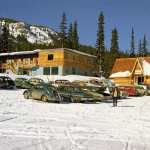FROM CATTLE EMPIRE TO CITY BEAUTIFUL: PENTICTON’S EARLIEST HISTORY
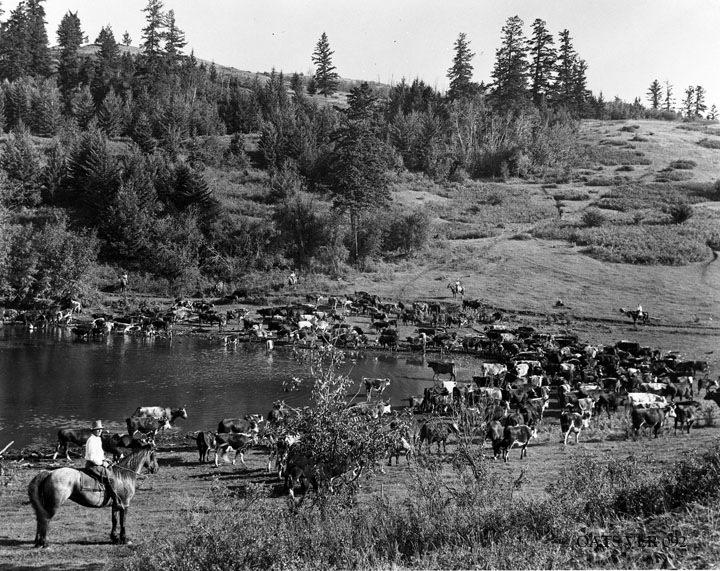
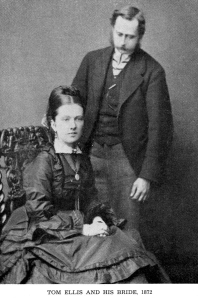 The Ellis Diary as Interpreted by Ed Aldredge
The Ellis Diary as Interpreted by Ed Aldredge
It was Tuesday, January 17th, 1865. Thomas Ellis had already said goodbye to Ireland – and probably his Wilhelmina, a day or perhaps two before. He and his family were now on board the ship at Southamption….
Tuesday, Jan. 17, 1865. I left Southampton today for British Columbia, on the Royal West Indian Mail Steamer “Shannon.” She was lying out in the river, and the passengers went on board in a tender: Mamma, Fanny, Uncle Fred & Cunningham accompanied me on board, and did not leave until just before she sailed.
We do not know who some of these people were, but it really does not matter, since none of them reappear anywhere other than in this single entry. There is nothing in the diary concerning the voyage, and whether or not Ellis suffered from mal-de-mar on the journey. But if the steamer was a side wheeler it would probably pitch and toss like a cork crossing the Atlantic in January, a season of customarily fierce storms. Having crossed that same ocean myself (“Empress of Ireland,” end of February, 1913), I know just how stormy it can get. Thus the gap in the diary at this point is understandable. The next one is quite explicit:
Friday, March 10, 1865. We arrived this morning at Victoria, where I met Captain Layton, who had a letter for me from Mr. O’Reilly. He was very kind to me and took me to call on the Governor. The weather is frightful here, the snow is lying quite thick and it is raining fast. March 10 and snow on the ground.
We can guess at Ellis’ impressions. Why in Ireland, the first crop of potatoes were up and….Just what sort of farming country could this be, with so late a spring. The next day was better.
Saturday, March 11. The weather is a little better today, and the snow is melting very fast. I was about a good deal with Captain Layton today, and he introduced me to a number of people. Captain Layton, Kingscote and I dined with the Governor this evening.
Hmm, dining with the Governor? Ellis’ friends in the new land must be rather influential….
Sunday, March 12. I went to the Cathedral this morning, as I had promised to bring McFarland to see Captain Kennedy. I lunched with them and afterwards went out to walk. I dined with Mr. Stewart at five and went to the Tin church with him afterwards.
Nothing so far, about what Ellis was to do in the new British Columbia, or Vancouver Island colonies, (there were both then).
Monday, March 13. Captain Layton and I called on the Bishop, and we intended to go for a ride afterwards, but it came on to be so wet we had to give it up. I dined at the Governor’s this evening also and called at the club afterward to see Captain Layton. Tuesday, March 14. I left Victoria this morning by the “Enterprise” at 8 o’clock, but we did not arrive here till nearly 6 o’clock. I knew Mr. O’Reilly quite well when I saw him in the distance; he is very little changed, except what change his beard makes.
The “here” in the above entry was obviously New Westminster, that being the only other community of any size in B.C. at that juncture. The following day’s entry, in part, reveals a slice of B.C. history. At this time there were actually two colonies, each with its own Governor, one on Vancouver Island, the other on the mainland, with New Westminster as the capital. Next, Ellis sees more of this new colony, replete in the raw state. He says,
Thursday, March 16th. The roads are in horrid state, with the snow thawing on them. I went into town with Mr. O’Reilly today and he introduced me to several people. Mr. O’Reilly took me to call on the Governor and we lunched with him. Friday, March 17th. There is a good deal of snow still on the ground, though it is thawing. We went out this afternoon to try to get a bit of shamrock, which we did, by scraping away the snow in patches. Mr. O’Reilly and I dined with Mr. Connell this evening.
Just like the Irish, grubbing around in snow and mud to find “…a bit of shamrock.” Have neither of you any dignity? Probably not too much, being Irish, they would go after the shamrock. Would the Scots do that to find a sprig of heather? Now read the next entry, and see what about dignity….
Saturday, March 18th. This had been a very wet and nasty day, as there is still a good deal of snow on the ground. Mr. & Mrs. Peter O’Reilly, Mr. Birch, Colonial Secretary, and myself had a great game of battledore and shuttlecock in the council chamber this afternoon.
Tut-tut, playing ping-pong in the august reaches of the COUNCIL CHAMBER? Probably because at that juncture there was no other room big enough, or with a table large enough for the game.
Sunday, March 19th. Mr. & Mrs. O’Reilly and myself went to church this morning. The road was certainly in a very bad state.
Ellis adds they went to church, “…to the Ark” in the evening.
Monday, March 20th. I went out this afternoon for a ride with Mr. Edwards. We rode out to the saw mill and back; it is not much of a ride, but it is one of the only ones there are about here (as) it is a place where there are only two or three roads that one can ride on.
No, the rest were trails between huge trees, stumps or thick with brush. Skipping an entry we record this.
Wednesdy, March 22. Mr. White and I went down in the canoe to Hay Ranch to shoot ducks. We took two Indians with us to paddle and cook, but as we did not leave till after 2 o’clock it was too late to shoot that evening, when we got there.” Thursday, March 23. We started early this morning, but were very unsuccessful all day, and we camped in the evening on a low island in the river, as it was too rough to cross the river over to the Hay Ranch. In the night we were flooded, as the tide rose till it covered the island. Friday, March 24. We started for home early this morning as all our clothes and blankets had been wet by the unexpected flood of the night, and we arrived here a little after 12 o’clock in a rather deplorable condition.
So ended the first of three attempts to get either ducks or geese, the only bag being a brace of ducks that Ellis got on their third foray.
Wednesday, March 29. The English mail came in yesterday and I was very much disappointed not to get any letters. Mr. O’Reilly got a man to begin clearing a lot he had lately bought near here for building purposes.
While it was three months since Ellis had left for Canada, it was likely far too soon for a letter to reach him. Since it took the “Shannon” or other boat nearly three months to bring him from Southampton to Victoria, a letter could not have gone much faster. Mail didn’t, in those days. Next a slight taste of hard work.
Thursday, March 30. Mr. O’Reilly and I got up early and went out to his lot where the man is clearing and worked till about 10 o’clock, which gave us a rather good appetite for breakfast. The Reliance, a steam boat, came down today for the first time this season.”
Evidently there was little steamer traffic on the Fraser in the winter months, perhaps because of sandbars, and the deadheads that surrounded them. A day or two later they made another expedition to the lot, Ellis says.
Monday, April 3. Mr O’Reilly and I got up early to out to his lot, which is being cleared, and I helped one of the men who are working on it, to cross-cut a very large tree, about 3 feet in diameter, which is about the hardest bit of work I have ever done.”
Cheer up Thomas, you’ll work a lot harder than that before you’ve been in this mountain country a year or two. And a tree, “…three feet in diameter…” was a sapling compared with many if not most of those in that area, where six-foot-at-the-base was fairly common. Ellis came down with a bad cold the following day, and was ill with it for about four days.
Sunday, April 9. It being beautiful weather we all went to church. Mr. Good had a child christened and Mr. O’Reilly being godfather we all went up there to luncheon after the service.
Ellis also mentioned that a Mr. and Mrs. Dewdey had dined with the O’Reillys the previous evening and again on the 9th. That was the first time Ellis had met the road-builder, politician, governor, Edgar Dewdney. And also the first time Dewdney encountered the future cattle king of the Okanagan. Doubtlessly, each was summing the other up.
Monday, April 10. It was just this day six years ago that Mr. O’Reilly landed in Victoria. We went out boating this afternoon as it was [such] a fine day, but we went out so late it was already beginning to get cold when we started. Next, Ellis witnessed a fragment of colonial politics, and was evidently impressed with what he saw.
Tuesday, April 11. I walked into Westminster this morning with Mr. O’Reilly and in the afternoon we all went to hear the council prorogued by the Governor, who came in uniform and a cocked hat for that purpose.
Thus, Ellis learns the dignity of the Empire was upheld even in such an outpost as this pacific colony. Later, he and others were to learn this was then, and still is a fundamental difference between the Canadian way” and that obtained in the country to the north. The following day Ellis and O’Reilly left for and reached Victoria, where each had things to do. Ellis says,
I went to call on Governor Kennedy in order to settle about Andy leaving the next day, in which (move) I was successful.” Andy McFarland was the partner Ellis was taking along to his future ranch.
Then comes another item that illustrates the anomaly of there being two colonies on the Pacific coast.
Friday, April 14. We left Victoria at 11 o’clock this morning with all our parcels. (Ellis’ duffel for his trip to the interior). But we did not arrive here (Westminster) until nearly 7 o’clock. I was very lucky to get all my things through the custom house without paying any duty.
In other words, when goods moved from one colony to the other custom tariffs were collected at each port of entry. Nice bit of business, that. But it wasn’t to last for long, the demarcation dividing the Island colony from that on the Mainland was soon to disappear.
Saturday, April 15. Andy and I have been planting strawberry plants and fruit trees all day for Mr. O’Reilly on his lot near this (house) which he is going to make into a sort of garden.
Wonder which tall building in New Westminster occupies that lot today?….
Tuesday, April 18. Have been very busy all morning getting some of my things packed and ready for a start tomorrow. I went down to the bank this afternoon and got my money, which I had lodged in the Bank of British North America.
Ellis Starts for the Interior
Wednesday, April 19. Our party, which consisted of Mr. O’Reilly, White, Andy, and myself and several constables left Westminster in the “Reliance” for Hope today, but as they are afraid to go up the river after dark, we anchored for the night at Harrison mouth.
Why, “…afraid to go up river after dark?” Simple, although Ellis doesn’t explain it. Just deadheads, half submerged logs or trees that cannot be seen in the dark, and which could stove in the wooden hull of the “Enterprise” in a flash. A sharp look-out had to be maintained [even] during daylight hours for these menaces to boat traffic on the Fraser. He continues;
Thursday, April 10. We left Harrison mouth this morning, but had not proceeded far, when we ran aground….
Another hazard on the lower Fraser then, shifting mudbanks, rarely in the same place twice.
Between pulling up the rapids by ropes, and having to go against such a strong current, we did not get to Hope tonight. Friday, April 21. I walked up from where the “Reliance” stopped last night to Hope and was ready this morning at the landing to get my things off. We have been very busy ever since, getting the packs ready for the Indians for a start over the mountains.
Saturday, April 22. We made a start this morning from Hope at about 9 o’clock. We found the first four miles very hard walking indeed, as the snow was about one foot to a foot and a half deep, and being very soft, we sank a good deal into it, and found it hard work….
All right Tom, you tenderfoot, that’s just the start of your initiation into mountain trails.
Sunday, April 23. We camped last night thirteen and a half miles from Hope and we intended to start very early while the snow was hard, but we could not do that, as all the Indians did not come up the night before and we had to wait, so we only made ten and a half miles that day.
Evn so, in the kind of going you’re experiencing, for a tenderfoot, you’re not doing too bad.
Monday, April 24. We got away middling early this morning and found the snow quite crisp and hard, so that it was very nice walking. We got over the first summit of the mountain today and camped a little further on, at one of Mr. Haynes’ old camps.
Tuesday, April 25. This morning was frightfully cold; it froze so hard in the night that everything was hard, even the cold beef we had with us. We made a long journey today, about fifteen miles, crossing the second summit and getting into the valley.
Just which valley that was, we are not certain, for there are a lot of them going in several directions. If it was the Skagit or later, the “freezing cold” experienced would be typical, as adiabatic[?] air swoops up one side of a mountain and then down the other, causing that chilling effect.
Wednesday, April 26. Mr. O’Reilly started on early before us, to try to arrange about getting horses, but we overtook him at Cragers’ (Krugers?). As the main trail was not open we remained there and arranged with the Indians to bring the horses in the morning. It came on to rain after we got in.
Thursday, April 27. The horses did not come till between one and two o’clock, and as it was then raining, we had to wait till it cleared up, so we did not start until 3 o’clock. We went a mile below Princeton and camped for the night.
Friday, April 28. There was a great delay about getting the horses ready for a start, so that we did not get away as early as we should have done. Andy got a shot at a deer today, as it was crossing the river, but as he had nothing but duck shot in, he only wounded it. We made about 20 miles.
Saturday, April 29. We got away about 6 o’clock this morning and arrived at Keremeos before 11 o’clock, where we remained till 2 o’clock for the horses’ sakes. Mr. O’Reilly was very anxious to get to Mr. Haynes’ today, but the horses were so tired that he had to leave the train 10 miles off and go on himself.
Sunday, April 30. We got away and went to Mr. Haynes about 9 o’clock. Mr. O’Reily bought several horses from Mr. Haynes for the government, and I bought several heifers from a driver who came past [who] had not money to pay his tolls.
Monday, May 1. Mr. O’Reilly was very anxious to have gone on today, but he could not, as he had to get his horses shod. There was a great deal to be got done before starting. Andy and I signed the contract of partnership this evening as Mr. O’Reilly intends starting early tomorrow morning.
Ellis does not say so, but it is evident that O’Reilly was going on east, to where the Dewdney Trail work had probably ended the autumn previously. However, the best laid plans….
I walked down with him to the Narrows, where he crossed the lake, and there we parted, he for the Kootenays, I in all probability for the Okanagan – after some time.
Destiny was beckoning Tom Ellis, although he did not realize it at the time. Hew would, quickly enough.
Okanagan Impressions
Tom Ellis had now reached a turning point in his quest for a ranch. He seems to have sensed this, although his actions did not altogether show he attached great importance to it. Instead, boy-like, he wanted to go on enjoying himself. Some of the responsibility for this must be laid at the door of “Andy” who emerges now as something of a light-weight. Andy had little sense of responsibility, and that, as Ellis came to grips with hard necessity may have been the root cause of their ultimate parting. His diary continues.
Wednesday, May 3. Andy and I went out to shoot some grouse, but as they were very wild, I only got two.
Wild? Not exactly; in the days before World War One, in parts of the Okanagan you could walk almost right up to them, if you were treading softly, which likely was just what Ellis and Andy weren’t doing.
Just after we had turned to come back, as I came down a small glen, I put up a deer, which I shot. We had great work to carry it.
Venison would be a much more worthwhile addition to the Haynes’ larder than the grouse, but carry it? No way. Two branches tied in a vee, like an Indian travois, then drag it, is one way out of that. There are, of course others.
Thursday, May 4. Cornwall arrived today with a small train; he came in just as we were finishing breakfast, having camped about three miles from here. I rode of Mr. Haynes’ horses down to the end of the lake (seven miles) to try to get some shot, but I did not succeed.
He wouldn’t, at near midday. Or, rather, the birds might be there but he wouldn’t see them.
Friday, May 5. Cornwall went on today. He left this place about 11 o’clock. He had given up on the idea of catching up (to) Mr. O’Reilly. I went across the lake for the first time today and we got an Indian to go and find my cattle, on condition of getting one dollar.
Saturday, May 6. I went in search of my heifers today, but although I went three miles or so up the valley, I could see nothing of them. The day was tremendously hot, so they may have been lying in some shady place where I could not see them.
That, or the previous owner had conveniently found them?
Sunday, May 7. This had been a very hot day and only that there was a high wind, it would have been unpleasantly hot indeed. The mosquitoes have begun to be very troublesome and are biting Andy and myself very much. Andy is in very bad spirits.
Monday, May 8. I went over the lake with Lowe in a small canoe. It was rather stormy at the time, but we got over quite safely. In the afternoon Andy and I went out to shoot; he put two pistol bullets into the gun to fire at a sand crane, and burst the gun.
That gives a graphic indication of Andy’s knowledge of firearms…Period..
Tuesday, May 9. Andy and I started out in pursuit of grouse as all the meat in the house was consumed excepting bacon and we succeeded in killing eight, which only did our dinner and breakfast, as Scott and another man were here.
Wednesday, May 10. Andy and I again started out in pursuit of dinner, which we succeeded in procuring in the shape of four ducks, which we shot up the river. Mr. Haynes’ Indians brought our heifers to this side of the lake today.
So, that was where they were; not at all where Ellis looked.
Thursday, May 11. We started after grouse again today and after some trouble succeeded in getting eight. The day was very hot indeed and we therefore found walking on the mountains very fatiguing. Mr. Dewdney returned this evening.
That, as it turned out was fortunate for Ellis, as subsequent events were to prove.
Friday, May 12. At the advice of both Mr. Dewdney and Mr. Haynes I bought a horse today for $70. I have been very anxious for the last week to buy one, but this was the first that came here that was for sale. Andy thinks I paid too much for the horse.
Andy would, because he didn’t have one himself.
Saturday, May 13. Mr. Dewdney started his train away yesterday, but he did not start himself till today; he did not leave this (place) till after 3:30, but intended to go on till he got to Rock Creek, where his train will be. It has rained nearly all day.
Sunday, May 14. I have not been at all well today. I was very sick in the morning and have not quite recovered yet. This had been a beautiful day, but rather too hot. The mosquitoes are pretty bad, already they have bitten Andy and me a good deal.
Monday, May 15. We started today for the Mission. (Fr. Pandosy’s, near Kelowna.) Mr. Haynes [is] going on business, I [am] going that I might see the country, before I finally fix on a place to settle upon. We did not start till 12 o’clock, so we only made about 15 miles.
That would place them somewhere just at or north of where Oliver is now. Quite likely they were travelling on the east side of Okanagan River, following an Indian trail, rather than on the west side of the valley. Tonaskat.” (Likely one of the Indians).
We were up very early for a start and were ready to leave camp at 4 o’clock, but we could not catch one of the horses, and Andy had to turn back for it.
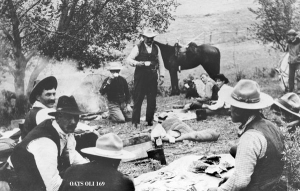 Wednesday, May 17. We had a very unpleasant trip today over a rough and mountainous country, by far the worst trail I have yet seen in this country. We camped without about 6 miles of the Mission.
Wednesday, May 17. We had a very unpleasant trip today over a rough and mountainous country, by far the worst trail I have yet seen in this country. We camped without about 6 miles of the Mission.
All of which indicates they had kept to the east side of Okanagan Lake, and had crossed part of the shoulder of Okanagan Mountain, or at least the approaches to it. He adds that both they and even more, the horses were tired.
We got into the Mission about 10 o’clock this morning and remained there all day, on hearing the complaints against the Indians, and as they were all at the top of the lake, Mr. Hayes determined to start for that (place) in the morning.
Friday, May 19. My efforts to buy a horse here yesterday were not successful. They all wanted too high a price, but we borrowed a roan mare from one of the settlers and I bought a horse from a man we met today ,so we had two fresh horses.
Saturday, May 20. We arrived at the head of the lake today and Mr. Haynes had a long talk with the Indians. There are a lot of fish to be had there now, at a very fair price. The Indians catch a great quantity of them every day.
What were they, trout – or Kokanee?
Sunday, May 21. We did not travel today, but stayed at the head of the lake. Captain Haughton came over from his place to see Mr. Haynes, and he asked us to come over and spend the evening at his place, which we did.
Monday, May 22. We left Captain Haughton’s place this morning, and went back to the head of the lake, where Mr. Haynes had another talk with the Indians and we there for could not get away before 2 o’clock, but still we made about 15 miles.
Tuesday, May 23. I got a great wetting crossing a stream to look at some land that I thought might suit me. The stream was very deep and the horse had to swim, and I got caught in some logs. We got to the Mission early today.
Was that stream he crossed part of the upper reaches of Mission Creek? And as for the land, he doesn’t say, but evidently it wasn’t satisfactory to him. [Perhaps the near-drowning put him off!]
Wednesday, May 24. We left the Mission about 2 o’clock, but as we travelled very fast we got into the mountains and had some trouble getting a place to camp, as there is not much grass about.
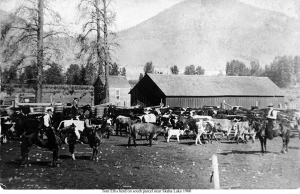 Thursday, May 25. We got as far as Penticton this evening, and I had a good look at the place, but I did not like the look of it, although everyone says it is a very good place for wintering cattle.
Thursday, May 25. We got as far as Penticton this evening, and I had a good look at the place, but I did not like the look of it, although everyone says it is a very good place for wintering cattle.
Later of course, Ellis was to discover just how good a place it was.
As they left Osoyoos, Ellis watched the territory, seeing few if any spots where he could start a cattle ranch; the area just north of Osoyoos did have a fairly wide valley, but, other than the small river flowing through it, that region was one of extreme aridity. North of that was another, smaller region, boulder-strewn, and if anything, even more arid than the larger valley, with one small creek coming out of a canyon to the east. They passed one lake, and another valley as small as or smaller than the others, then a much larger lake, with nothing but rolling hills, or steep mountains fringing it. Then Haynes slowed a bit and spoke to him.
“The Penticton area is next, so take a good look at it, Tom.” Tom did and wa singularly unimpressed with what he saw. As they left the first of the two lakes they had passed, he saw what appeared to be a larger lake fringed with gray-white cliffs and steep hills or mountains, with a large open expanse between where they were and that lake. There was a river slowly wriggling its way through that expanse, the stream marked by reeds throughout its length, a sure sign of boggy ground. There were creeks all over the place on the eastern side of the open area, with rocks and boulders everywhere among them, and copses of poplars in many places, and pines he first here and there throughout the region. There were open stretches of desert-like gray-green land at the tops of the cliffs. How on earth could a man create a cattle ranch out of a location like this? He did not know the answer, and doubted if anyone else did either.
Ellis Goes to Trail
There are only a few more entries in Ellis’ diary, or what we have been able to find of it, so far. His impressions of the Kootenays, where he spent at least the summer of 1865 and perhaps longer, and then his return to the Okanagan and the reason for his change of mind about Penticton would be interesting, but not vital to this history.
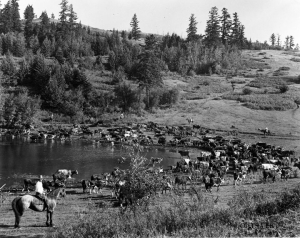 His diary does record that Andy and Ellis planted “…some potatoes, for seed,” at Osoyoos, and his daughter, Dr. Kathleen Ellis told this writer that her father made “…several trips back from where he was working, to tend the potato patch….”
His diary does record that Andy and Ellis planted “…some potatoes, for seed,” at Osoyoos, and his daughter, Dr. Kathleen Ellis told this writer that her father made “…several trips back from where he was working, to tend the potato patch….”
The way those potatoes produced may have been convincing, showing Ellis the extreme fertility of virgin Okanagan soil. Dr. Ellis said that her father worked at a station on the Dewdney Trail, “…near the Columbia River,” and she and I deduced that the site of the present city of Trail was the place. A summer, and perhaps longer, spent there would have introduced Ellis to the importance of mining to British Columbia, and the needs of the mining communities for a supply of quality beef, leading to his later on becoming the source of that supply. Tom Ellis was shrewd enough to see this.
On May 24, 1866, Ellis returned to Penticton, and set up the start of his cattle ranch. Andy may have been with him then, but evidently did not remain for long, which is not surprising. Ellis was serious about starting his cattle ranch. Ellis had the capital for that start, but apparently
Andy didn’t, and didn’t seemingly wish to be tied down to the arduous work needed for a cattle ranch.
Without going into too many details, we know that Ellis took over properties in the Penticton area starting in 1866 and that he later filed on a pre-emption in 1869. That “69” was significant, for it led to Ellis adopting the “69” brand, which is the same either way up, and would thus appeal to the young Irishman. Other than the heifers he bought at Osoyoos, we haven’t the slightest idea where the rest of his cattle came from. The guess is that he may have got some from Richter, or else through Haynes at Osoyoos that is not particularly important, what is, is that he got them and speedily set up the basis of his ranch. What was Penticton like in those early days? That’s a story for another day.

